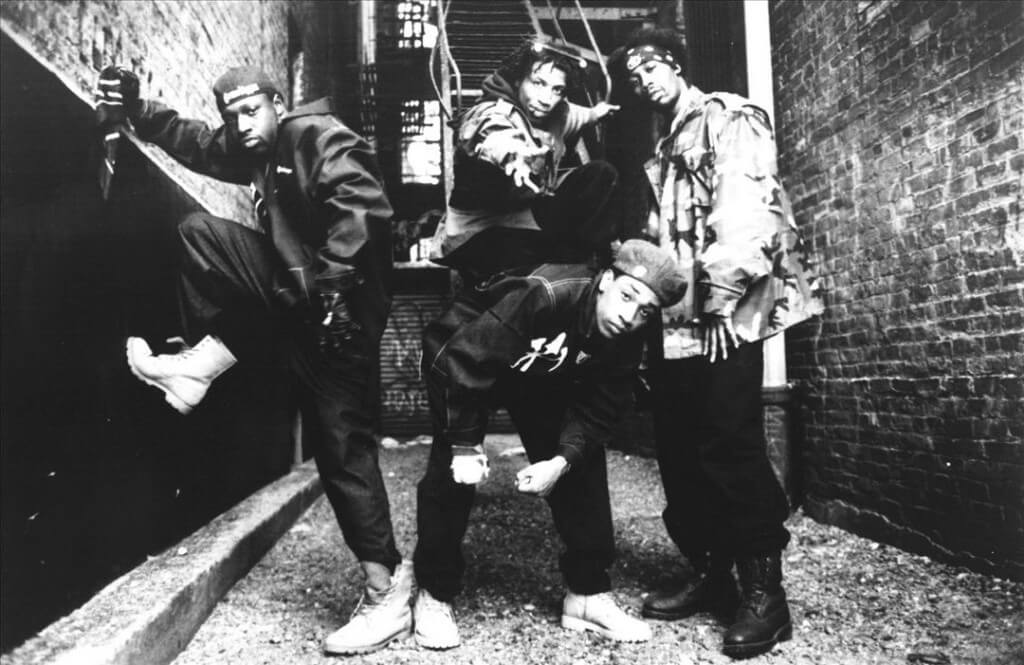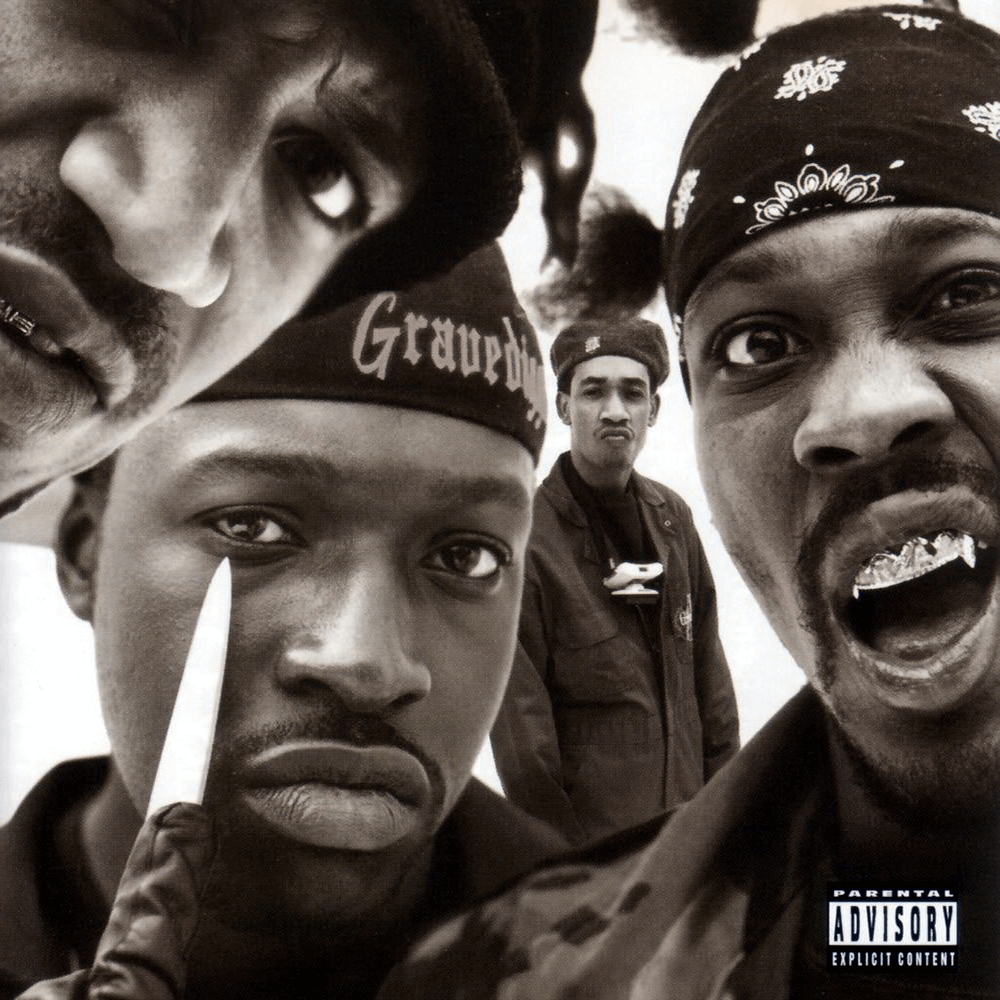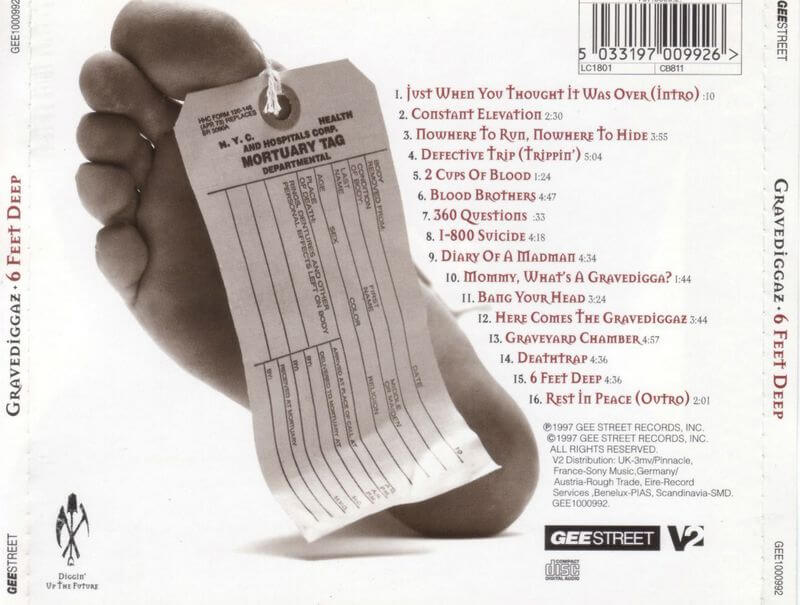Gravediggaz is a Hip Hop supergroup formed in the early 1990s in New York City. The group features two of Hip Hop’s most influential producers and personalities, and two lesser-known but still highly competent MC’s. Wu-Tang Clan’s RZA, known as The Rzarector, formed Gravediggaz just before Wu-Tang had started to earn a name in the Hip Hop community. Former Stetsasonic member and De La Soul’s house producer Prince Paul, known as The Undertaker, served as the man behind the boards and brought fellow Stesasonic member Frukwan, also known as The Gatekeeper, into the mix as an MC. Rounding out the supergroup was underground rapper Too Poetic, also known as The Grym Reaper.
The group got together after each member had been dealt tough blows by Tommy Boy Records. Prince Paul, Frukwan and Stetsasonic had had issues with Tommy Boy in the early 1990s and were dropped from the label after success in the 1980s. Around the same time, and before Wu-Tang Clan appeared on the scene in 1992, RZA had mild success under the name Prince Rakeem. He was also signed to Tommy Boy and was also dropped in a rather ruthless way. Too Poetic had tried to make a foray into the record industry on Tommy Boy but had issues getting much exposure, which led to the rapper being broke and homeless. Essentially, each member of Gravediggaz had bad luck on the infamous Tommy Boy label and happened to find each other in the same frustrated state. They felt like their graves had been dug and their careers were over, which almost certainly led to the group’s name.
While RZA had rebounded by 1993 with the explosion of Wu-Tang Clan, and while Prince Paul was achieving a lot of success with De La Soul at the same time, there was an underlying anger in all four group members when they had formed. They saw the Gravediggaz project through at the time of some of their bigger individual career successes and decided to put out a record. 1994 saw the release of the seminal 6 Feet Deep, which was known by the name Niggamortis outside of the United States.
The album is a remarkable piece of music, both for what you hear on the album and the all-star cast. Hip Hop supergroups didn’t usually put out full albums at the time, as LP’s were generally known to be released by rock supergroups, which there had been many of by the 1990s. Gravediggaz were trendsetters, and not just for their supergroup status in Hip Hop. Whether intentional or not, they created the “horrorcore” Hip Hop sound on this record, which was recorded between 1991 and 1994. The album featured lyrical topics about the macabre, and each of the members took on a horror movie-type pseudonym. The beats, done mostly by Prince Paul with some contribution from RZA, were equally as dark and took the 1990s east coast “boom-bap” sound to ominously deep new levels.
While Prince Paul provided arguably the best production of his career on this record, and while RZA showed a maniacal personality that made his early Wu-Tang verses appear tame at times, Frukwan and Too Poetic’s performances are not to be overlooked. The two share the rhyming duties with RZA and do a masterful job of constructing hardcore, horror-themed rhymes. The lyrics from Poetic, Frukwan and RZA could even be seen as comical since they are so graphic, and one who makes this assessment is no doubt correct to a certain degree. It is pretty clear that the lyrics are so dark and ridiculous that they are essentially a twisted extension of the sense of humor of the lyricists (and also Prince Paul, who contributes some humorous lines on the album’s skits). The album is intentionally over-the-top from a lyrical standpoint, and can only be fully appreciated by the listener if this is taken into consideration.
Despite the humorous twinge to some of the lyrics, the album still demonstrates a heavy leaning towards the sinister. “Defective Trip (Trippin’)” addresses the visual spectacle of a strong hallucinogenic trip, while “1-800-SUICIDE” pokes fun at the suicidal and even gives them some “advice” as to how to best kill themselves off. “Diary of a Madman”, perhaps taking influence from the Ozzy Osbourne song of the same name, features each of the MC’s in a courtroom setting, testifying all details of brutal murders they have committed. “Nowhere to Run, Nowhere to Hide” and “Blood Brothers” feature the MC’s kicking unforgiving death raps. “Death Trap”, which features an intro from Masta Ace, features third-person storytelling of three doomed souls who could very well be every-day characters in the ghetto. Some songs are more memorable from a lyrical standpoint than others, but all have quite a unique quality to them – one that you’d be hard-pressed to find on any other Hip Hop album ever released (even the leading “horrorcore” albums released).
https://www.youtube.com/watch?v=b4gQP5r4IyU
The lyrics are unique and artistic in their own sense, but the beats are an equally captivating draw to this record. Delivered primarily by Prince Paul, the production is essentially a darker and slightly more advanced version of what you’d find on an early De La Soul record. As I mentioned above, this could very well be Prince Paul’s best work – which is a bold statement, considering some of what he did both before and after 6 Feet Deep’s release in 1994. He utilizes piano samples abundantly on “Constant Elevation”, “Defective Trip (Trippin’)”, “2 Cups of Blood” and the album’s title track. Also on “Defective Trip”, Paul brilliantly cooks in a stunning guitar sample on the song’s hook, taken from 1970s rocker John Ussery’s “Listen to the Melody”. The bassline on “1-800-SUICIDE” drives the entire song, and is one of the most moving low-ends I’ve heard in all of Hip Hop. A relentless synth/bass effect takes over the furious “Bang Your Head”, while a particularly dark boom-bap shuffle blasts “Graveyard Chamber” into the stratosphere. “Pass the Shovel”, which only appears on Niggamortis, the European version of the record, sounds perhaps the most like De La Soul from a production standpoint. Paul brings his A-game here, and the album ends up being one of the best – and subsequently under-appreciated – production efforts of all-time.
The album loses minimal points due to a low but still noticeable amount of filler, as cuts like “Mommy, What’s a Gravedigga?” and “Here Comes the Gravediggaz” don’t overly impress and captivate like the rest of the record. However, a few notable (and sometimes fleeting) guest appearances give the album an interesting quirk: Wu-affiliates Killah Priest and Shabazz the Disciple make their first recorded appearances on “Diary of a Madman” and “Graveyard Chamber”. Biz Markie and MC Serch give uncredited, brief vocal samples on “Defective Trip”, and as mentioned, Masta Ace appears, also uncredited, on “Death Trap”.
What makes 6 Feet Deep so special is the fact that no album in the history of Hip Hop or music sounds anything like it. Even Gravediggaz’ follow-up 1997 album, The Pick, the Sickle & The Shovel, fails to sound anywhere close to their debut. Later “horrorcore” albums, including those from southern legends Three 6 Mafia, Sacramento’s Brotha Lynch Hung and even from Kool Keith, under the Dr. Dooom pseudonym, don’t do the “horrorcore” moniker justice like 6 Feet Deep does. Quite fitting for an album that essentially invented the sub-genre. The album deals with the dark, occult-laden topics with just enough malevolence and just enough humor to make the lyrical content not appear over-the-top or, on the other hand, too soft. The production is an absolute spectacle, and Prince Paul out-duels RZA on this record, despite saying next to nothing, as the most impactful of the two “celebrity” members of the group. But all four members give an equal contribution, which is quite surprising given the relatively “underground” status of Frukwan and Too Poetic compared to the other half of the group.
6 Feet Deep is a timeless record, which captures four unique artists putting their talents together, in a very interesting snapshot of time, during one of Hip Hop’s most important years. RZA would go on to become one of Hip Hop’s most successful artists, leading the Wu-Tang Clan to millions and millions of record sales and a worldwide empire. Prince Paul would go on to produce for countless artists and projects, and would deliver one of Hip Hop’s first “concept albums”, 1999’s stunning A Prince Among Thieves. Both artists would essentially leave Gravediggaz by the late 1990s, while Too Poetic and Frukwan would continue the group for a couple more unheralded records before Too Poetic’s untimely 2001 death from colon cancer.
All four artists left an unforgettable impact on Hip Hop music with 6 Feet Deep, which should grab attention due to its lineup alone. However, with a close listen to the album, any listener will enjoy one of Hip Hop’s most unique records ever, and will get a first-hand experience of some of Hip Hop’s rawest talent. 6 Feet Deep is perhaps the most unknown classic in Hip Hop, and should undoubtedly be celebrated as one of the genre’s true works of art.


